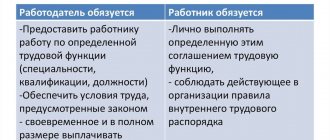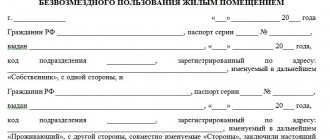Cases of transferring non-residential premises for free use are not common in practice. As a rule, they resort to concluding such a transaction to avoid taxation or provide it to relatives from whom it is inconvenient to withhold rental payments. The legislation does not interfere with such contractual relations when an agreement is drawn up on the free use of real estate.
Everything about free use of residential premises!
Free use of non-residential premises - what is it?
A special feature of such a transaction is the opportunity for the tenant to use non-residential premises within the framework established by the agreement, free of charge. A characteristic feature is the right to use the received area free of charge, i.e. the landlord does not benefit from this.
The procedure for registering non-residential premises related to the transfer of property for use for a time and without setting a fee is stipulated in Chapter 36 of the Civil Code. In particular, information about the contract is contained in Article 689.
The question then is, why draw up such an agreement? The answer is obvious; it can spell out all the points regarding the state in which the premises are transferred and must be returned, as well as many other conditions. Also, the tenant can be sure that when inspected by the competent authorities, the non-residential premises will not be considered illegally seized, but transferred temporarily under an agreement.
Between whom can it be concluded?
The agreement is concluded between two parties - the owner of the premises and the tenant. The representative of any of the parties can be an individual, a legal entity (organization) or an individual entrepreneur.
The law prohibits concluding such an agreement between an organization and an individual who is its founder or manager.
Validity
The parties can independently agree on the period for which non-residential premises can be transferred and accepted under a free use agreement. If it is not specified in the contract, then the document is recognized as unlimited.
Agreement for free use of a garage between organizations sample
As already mentioned, the main distinguishing feature of such a document is the absence of rent - otherwise the agreement for the gratuitous use of non-residential premises would be no different from a standard rental agreement. In addition, use is not completely free of charge - the borrower bears all costs for maintenance and routine repairs of the premises (unless otherwise specified in the text of the agreement). The transferred premises must be specified in detail by mentioning the exact address and all characteristics, otherwise the contract cannot be considered concluded - this is especially true when part of the building or one of the premises in an array of similar objects (warehouse, garage) is rented under the contract. Sometimes the parties have to deviate from the conditions for the use of non-residential premises prescribed by law.
The lessor can only be the owner of the property or persons authorized by the owner. The lease term is specified in the agreement. A real estate lease agreement concluded for a period of more than eleven months is subject to mandatory state registration. The tenant is obliged to pay rent and use the property only in accordance with the agreement and return the leased property upon termination of the lease in the same condition, taking into account normal wear and tear. The law may establish types of property that are prohibited from being leased: weapons, strategic objects, etc.
How to correctly draw up an agreement for the gratuitous use of non-residential premises?
The agreement must be concluded in writing. Since the law does not establish a strict form of the document, the parties set out their agreements in it in the format in which they want to see them. Only their legality is respected.
The annex to the contract, its integral part, is the acceptance and transfer certificate of the premises, which describes in detail the condition of the object at the time of transfer. All shortcomings and defects must be contained in this document as accurately as possible. The return of the premises due to the expiration of the contract or its early termination also occurs on the basis of a transfer deed.
Contract structure
The contract for the free transfer of premises for rent contains the following clauses:
- Title of the document;
- number, date and place of its compilation;
- full names (names) of the parties to the transaction, their data;
- description and characteristics of the subject of the contract in accordance with the documentation;
- the estimated value of the object, established either by agreement of the parties or by book value;
- the duration of the agreement (if it is not specified, the agreement is considered unlimited);
- the conditions under which the premises can be used by the tenant;
- procedure for provision and return of property (non-residential premises);
- rights and obligations of each party to the transaction;
- responsibilities for the maintenance of this premises with the establishment of obligations to pay all related expenses;
- liability of the parties;
- conditions for changing, terminating the contract and resolving disputes;
- details and signatures.
Sample agreement for the free use of non-residential premises in 2021
Download in Word format:
- agreement for free use of non-residential premises: form and sample
- act of acceptance of transfer of gratuitous use of non-residential premises
What documents will be required?
To formalize the agreement, the parties will need to prepare the following documents:
- for a legal entity - a document confirming the authority of the representative to act on behalf of the organization, for an individual - an identity card;
- title documents of the owner for the non-residential premises that are the subject of the agreement;
- technical documents for non-residential premises: extract from the Unified State Register, technical passport.
Registration of the agreement
The legal consequences of a transaction in most cases arise after state registration of the agreement (Article 164 of the Civil Code). But in accordance with an agreement on the gratuitous use (loan agreement) of non-residential premises, the property is transferred from the owner to another person, and then returned to him in the same condition, taking into account certain wear and tear or changes stipulated by the agreement.
Such an agreement does not fall within the scope of clause 2 of Art. 609 of the Civil Code, since it is not a lease transaction. Therefore, regardless of the period of use, it is not subject to state registration.
An exception is the case when the subject of the contract is an object of cultural heritage. It is subject to Art. 609 of the Civil Code, as follows from the text of paragraph 3 of Art. 689 Civil Code.
Free use agreement
Under this agreement, the lender undertakes to provide the borrower with any property for temporary use without charging a fee. In this case, the borrower undertakes to return the property within the period established by the agreement, in the condition in which he received it. Normal wear and tear is considered to be wear and tear that occurs as a result of normal use of the item throughout the year, without breakdowns, without a sharp deterioration in presentation.
- This agreement has another name - a loan agreement and is concluded, as a rule, between relatives or friends when the use of an item is free of charge. If in fact the lender plans to charge a fee, it is better not to enter into a loan agreement, but to formalize the transfer of the thing for paid use as expected, for example, by concluding a lease agreement.
The following are often rented out for use: apartments, rooms, cars, garages, furniture, equipment, etc. The structure and content of the loan agreement are usually standard and include the following points:
- Full name and passport details of the parties.
- Subject of the agreement. Here it is necessary to name the object or thing transferred for use, indicating its main features and characteristics by which it can be recognized. Without indicating such signs, the contract cannot be considered concluded.
- Duration of the agreement.
- Grounds for termination of the contract.
Special conditions:
- all separable improvements that arise during the use of the thing or property become the property of the borrower (if the improvements are inseparable, it is possible to receive compensation from the lender, provided that everything was done with his knowledge and consent);
- the borrower is obliged to use the property for its intended purpose (it is recommended to stipulate this in the agreement);
- Please note that use is free of charge;
- the receiving party is responsible for damage or loss of property (the lender is responsible for existing deficiencies);
- Any thing that does not lose its natural properties during use can be given for use;
- the condition of the thing at the time of transfer for use must be recorded in the contract;
- When transferring equipment for use, the borrower is given instructions for use, a technical passport of the product, as well as other necessary documents.
Agreement for free use
City.
«»
We, (full name), on the one hand,
and (full name), on the other hand,
have entered into this agreement as follows:
Nuances when filling out
The conditions for transferring non-residential premises for use must be specified. The transaction is free of charge, so no rental payments can be established. But all issues related to the costs of maintaining the property should be discussed. If this is not done within the framework of the contract, then the parties are unlikely to be able to avoid disputes on this issue.
An essential condition is also a description of the object transferred by the owner to the tenant for use. It must be detailed so that it is possible to establish that it belongs to real estate non-residential property.
Also determine the fate of improvements that can be made during the period of use of the premises: separable and inseparable. If this is not specified, then the inseparable improvements remain at the disposal of the owner without the possibility of receiving compensation for them.
Agreement for Free Use of Garage
The Civil Code of the Russian Federation for lease agreements does not apply to loans. Therefore, an agreement for the gratuitous use of non-residential premises, concluded for any period (including for a period of more than 1 year), does not require written form. The exception is cases when the cost of the subject of the contract exceeds the minimum wage by 10 times or more, or when one of the parties is a legal entity. An agreement for the gratuitous use of non-residential premises refers to transactions that do not have a price. How to draw up an agreement for the gratuitous use of residential premises. In this case, no monetary payments are required in return, since the document represents a lease of housing on a free basis.
We recommend reading: Procedure for Expulsion from a Paid University
For failure to fulfill or improper fulfillment of their obligations under this agreement, the parties bear property liability in accordance with the current legislation of the Russian Federation. 4.2. The lender is responsible for the defects of the garage that he intentionally or through gross negligence did not stipulate when concluding the agreement for gratuitous use and did not indicate in the acceptance certificate. If such deficiencies are discovered, the Borrower has the right, at his choice, to demand from the Borrower to eliminate the deficiencies free of charge or reimburse his expenses for eliminating the deficiencies or early termination of this agreement and compensation for actual damage incurred by him. 4.3.
Rights and obligations of the parties
By agreeing to the terms of the agreement, the tenant acquires certain rights in relation to the non-residential premises:
- the right of use in accordance with the purposes specified in the contract (i.e. with written agreement with the owner), the tenant is obliged to notify the owner in writing about all changes;
- the right to terminate the contract early for good reasons or at your own request. This right is the same for both parties;
- the right to compensation for losses when the initiator of termination of the contract is the owner, and the tenant suffers losses, for example, from an interrupted production process.
Here you can specify the owner’s rights to conduct inspections in order to clarify in which direction the premises are used. If the terms of the agreement are violated, he has the right to initiate termination of the contractual relationship.
The tenant's responsibilities are:
- careful treatment of the property received under the agreement;
- payment for utility services (for the maintenance of the premises);
- carrying out routine repairs;
- return of the object within the period established by the clause of the contract.
Agreement for free use of a garage
4.1. For failure to fulfill or improper fulfillment of their obligations under this agreement, the parties bear property liability in accordance with the current legislation of the Russian Federation.
3.1. The Lender undertakes:
- transfer the garage in a condition suitable for use in accordance with its purpose to the Borrower under an acceptance certificate for free use within ____ calendar days from the date of signing this agreement;
- inform the Borrower about the shortcomings of the garage, if any;
- at the request of the Borrower, eliminate the detected deficiencies at his own expense or reimburse the Borrower for the costs incurred by him to eliminate the detected deficiencies.
Agreement for Free Use of Garage
Gr. RF [F. I. O.], [value] year of birth, registered at the place of residence at the address: [full address], passport series [enter the required one] N [enter the required one], issued by [name of the authority that issued the passport] [date, month, year ], department code [enter as necessary], hereinafter referred to as `Lender`, on the one hand and gr. RF [F. I. O.], [value] year of birth, registered at the place of residence at the address: [full address], passport series [enter the required one] N [enter the required one], issued by [name of the authority that issued the passport] [date, month, year ], department code [enter as necessary], hereinafter referred to as `Borrower`, on the other hand, have drawn up this act on the following:
We recommend reading: Job salaries of kindergarten teachers in the Odintsovo Municipal District in 2021
1. The Lender transferred, and the Borrower accepted for free use, non-residential premises (garage) N [fill in as required], free from property rights and claims of third parties, located in the auto cooperative N [fill in as needed] at the address: [fill in as needed], total area (according to internal measurement) [in numbers and words] sq. m, cadastral number [enter as required], according to the technical passport of non-residential premises compiled by [name of the organization carrying out technical inventory of real estate] as of [date, month, year].
Agreement for free use of a car
Gr. __________________________________________________________, hereinafter referred to as the Borrower,” on the one hand and gr. ________________________________________, hereinafter referred to as the “Lender”, on the other hand, have entered into this agreement as follows:
1.1. The Lender transfers for temporary use to the Borrower a vehicle owned by the Lender on the right of private ownership in accordance with the vehicle registration certificate No.________________, a car of brand ________________, manufactured ________, engine No. ___________, body No. ___________, _____________ colors, license plate __________________________, registered with the State Traffic Safety Inspectorate of the ________________________________ region.
Agreement for free use of a garage between organizations sample
Garage lease agreement, sample, form A garage is a real estate property, therefore, when renting it, it is necessary to take into account the existing features of transactions with this real estate. Rules for drawing up an agreement The agreement is drawn up in two copies, one of which is kept by the tenant, the other by the lessor. If the lease form is for a period of more than one year, then another copy must be signed, which will remain upon registration with the relevant registration authorities.
Agreement for gratuitous use of property Under an agreement for gratuitous use (gratuitous loan), one party (lender) undertakes to transfer or transfers property for gratuitous temporary use to the other party (borrower), and the borrower undertakes to return the same property in the condition in which he received it, with taking into account normal wear and tear or in a condition caused by (clause 1 of Article 689 of the Civil Code of the Russian Federation)




